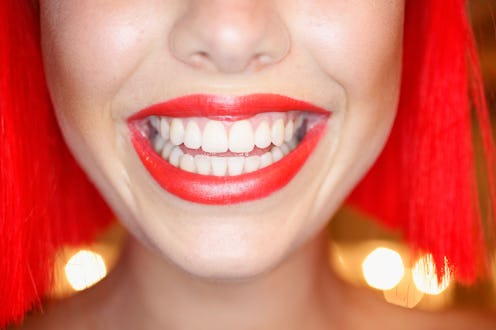Life
Those Teeth Whitening Strips? They Can Mess With The *Inner* Layer Of Your Teeth, A New Study Says

Your smile is one of the first things people notice about you, so what’s the harm in reaching for those teeth-whitening strips every now and then? I hate to be the bearer of bad news, but there could actually be some harm; researchers from Stockton University in New Jersey found that teeth-whitening products cause tooth damage, according to a news release. The researchers found that hydrogen peroxide, which the active ingredient in whitening strips you can buy at the pharmacy, can damage an inner layer of the tooth, the news release said.
The researchers presented three new studies during the American Society for Biochemistry and Molecular Biology annual meeting that found teeth-whitening strips can damage the dentin tissue, which is beneath the tooth’s enamel, according to the news release. The tooth is actually made up of several layers, according to Healthline; the enamel is the outermost layer, the dentin is the next layer, and the pulp cavity is the innermost layer.
Most studies on teeth-whitening products have focused on the enamel, which has very little protein, but this time the researchers studied the dentin, which is made of mostly collagen and has a lot of protein, according to the news release. The researchers used entire teeth and artificial saliva, CNN reports, and after applying hydrogen peroxide, they saw the collagen in the teeth break down into smaller proteins.
"We sought to further characterize what the hydrogen peroxide was doing to collagen," Kelly Keenan, Ph.D., associate professor of chemistry at Stockton University in New Jersey, said in the news release. "Our results showed that treatment with hydrogen peroxide concentrations similar to those found in whitening strips is enough to make the original collagen protein disappear, which is presumably due to the formation of many smaller fragments.” But what the researchers don’t know yet is if the damage cause by teeth-whitening products is permanent, or if the collagen and other proteins can regenerate, the news release said.
Teeth-whitening has become a $3.2 billion global industry and continues to grow, according to a 2017 NPR report. And figuring out how to get those pearly-whites so pearly-white can be confusing, since teeth-whitening products don’t need approval by the Food and Drug Administration, says NPR. But they all basically work the same way: they use peroxide to bleach the tooth enamel, according to The Chicago Tribune. The American Dental Association does offer some guidance on how to choose whitening products by allowing manufacturers to apply for the ADA seal of acceptance, says NPR, so if you see that on a whitening product, you know it’s backed by the ADA.
It’s important to remember that tooth discoloration can be caused by cavities or oral problems, NPR reports, so you might want to check with your dentist before trying to get rid of a stain with bleach. And not all tooth stains are created equal; surface stains caused by drinking dark-colored liquids or smoking cigarettes can usually be taken care of through regular oral care, says NPR, but even if you bleach deeper stains away, those effects are temporary and will need repeat bleaching.
With so much information out there about how to get your teeth whiter, it can definitely be hard to know what’s accurate or safe. If all else fails, you can always call your dentist before trying a teeth-whitening product or technique. They should be able to help you figure out if something is safe for your smile.